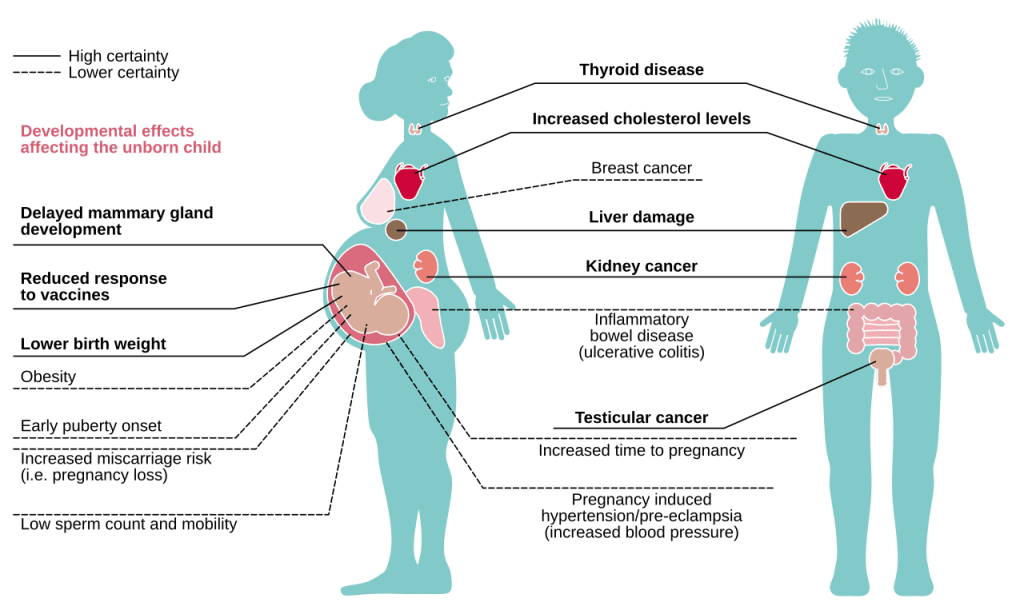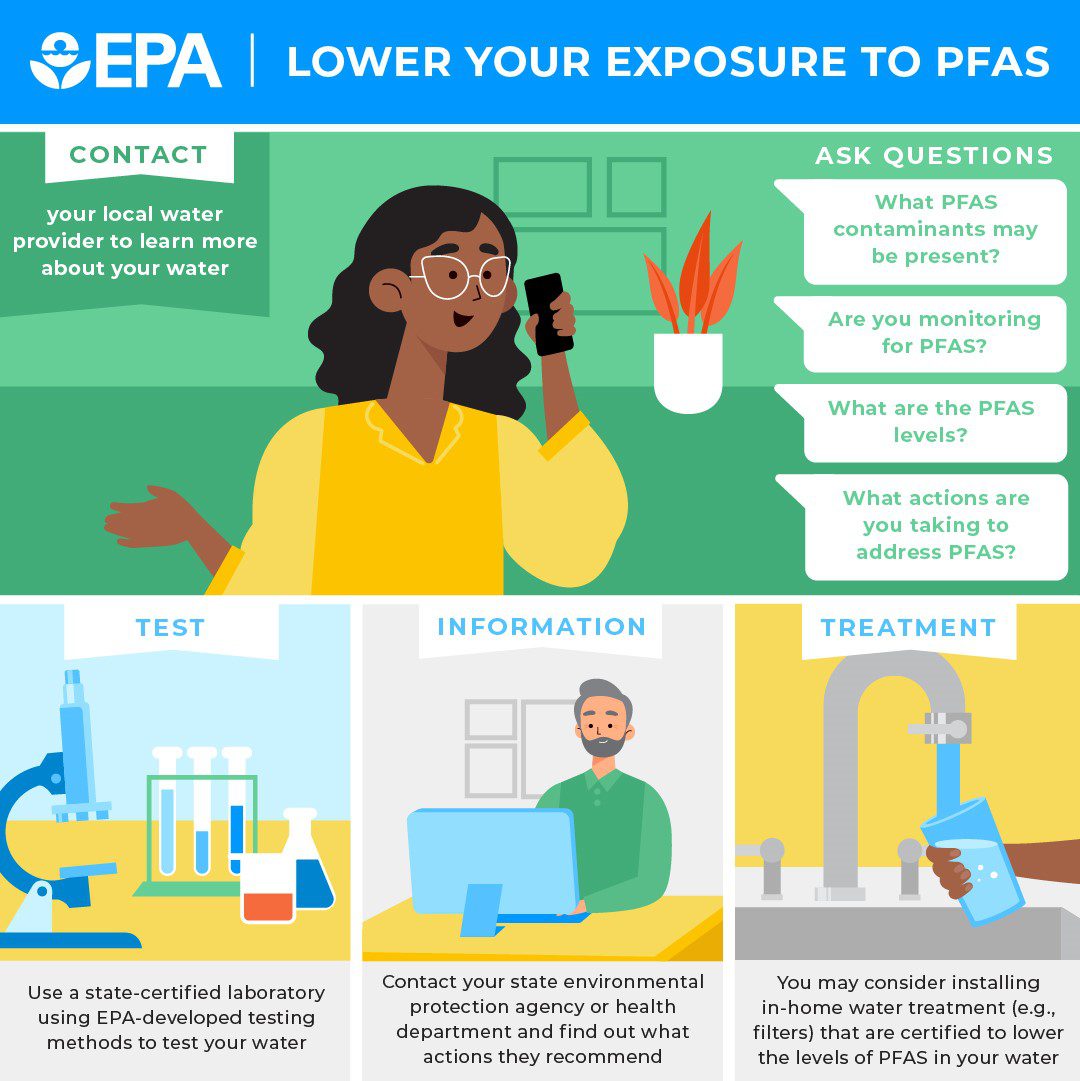- New Mexico is implementing the PFAS Protection Act (HB 212), which phases out most intentionally added “forever chemicals” and requires labeling of PFAS-containing products.
- PFAS are manmade chemicals linked to cancers, reproductive harm, and immune disruption, found in nonstick cookware, waterproof fabrics, and firefighting foams.
- Chemical industry groups oppose the labeling rule, citing concerns about cost, supply chain complexity, and potential harm to innovation.
- State officials continue to address PFAS contamination near military sites, offering blood testing, well sampling, and free filtration systems to affected residents.
Thursday, October 23, 2025 — New Mexico officials are moving forward with new rules that would require labels on consumer products containing PFAS, often called “forever chemicals” because they don’t easily break down in the environment or the human body. The rules are part of the state’s new PFAS Protection Act, which aims to phase out most uses of these chemicals in everyday items such as nonstick cookware, waterproof clothing, cosmetics, and carpets. Studies have linked PFAS exposure to health problems including certain cancers, fertility issues, and liver and immune system damage.
While environmental and health advocates say consumers have a right to know what’s in their products, chemical industry groups are pushing back. They argue that the labeling rules are confusing, difficult to enforce, and could hurt businesses. Meanwhile, New Mexico continues to deal with PFAS contamination from firefighting foams used at military bases, where recent testing found the chemicals in the blood of nearly all Curry County residents who participated in a study. State officials are offering free well testing, health consultations, and water filtration systems for those affected.
The following article was written by Danielle Prokop and published by Source New Mexico . It is republished here under the Creative Commons license CC BY-NC-ND 4.0.
. It is republished here under the Creative Commons license CC BY-NC-ND 4.0.
New Mexico’s efforts to regulate PFAS attracts national industry pushback
by Danielle Prokop, Source New Mexico
October 21, 2025
New Mexico officials this week will share information about forthcoming laws requiring labeling for products that contain so-called “forever chemicals.”
The virtual meeting on Wednesday follows recent proposed rulemaking
on Wednesday follows recent proposed rulemaking for both labeling and restricting such products, and comes amid national pushback from industry.
for both labeling and restricting such products, and comes amid national pushback from industry.
The proposed rules come via House Bill 212—the PFAS Protection Act—passed by lawmakers in the 2025 legislative session. The bill institutes the phasing out of most intentionally added per and poly fluoroalkyl substances— PFAS —from in everyday items.
—from in everyday items.
This class of manmade chemicals, which has thousands of variants , resist breaking down in nature and can accumulate in water, soils and increasingly in the blood and bodies of humans and animals around the world. Because of PFAS’ durability, they’ve been used extensively in materials for waterproofing, nonstick cookware, makeup, carpets and firefighting foams.
, resist breaking down in nature and can accumulate in water, soils and increasingly in the blood and bodies of humans and animals around the world. Because of PFAS’ durability, they’ve been used extensively in materials for waterproofing, nonstick cookware, makeup, carpets and firefighting foams.

Studies on PFAS’ health impacts remain ongoing, but have thus far been linked to kidney and reproductive cancers, decreased fertility, fetal developmental delays, disruption of immune responses and liver functions in people.
to kidney and reproductive cancers, decreased fertility, fetal developmental delays, disruption of immune responses and liver functions in people.
American Chemical Council , an industry group representing 190 chemical companies, said it opposed the labeling requirements and called the department’s proposed rule “inconsistent” in an Oct. 14 statement
, an industry group representing 190 chemical companies, said it opposed the labeling requirements and called the department’s proposed rule “inconsistent” in an Oct. 14 statement  to Chemical and Engineering News.
to Chemical and Engineering News.
The group plans further participation in rulemaking, officials told Source NM in a statement.
“There are a number of concerns and questions about the scope of the New Mexico proposal, and we’ll be actively engaged in the rulemaking process to advocate that any requirements are based on credible science, do not mislead consumers or users of products, or create overly burdensome requirements that could negatively impact innovation and economic development,” Senior Director of Product Communications Tom Flannigan said.
Secretary James Kenney told Source NM that he expected the department to “face headwinds,” on rulemaking.
“We know that we’re going to face national resistance, and the question that I need New Mexicans to wrestle with –- and to be clear, we’ve wrestled with it — ‘Why are we going to let outside voices from Washington, D.C., telling you what should be on your kitchen table with or without PFAS, with or without your knowledge.”
Carla Hutton , the senior regulatory analyst for Bergeson and Campbell, an international law firm based in Washington, D.C. that often represents chemical industry groups before federal and state regulators, said the labeling requirement issued by New Mexico came as a real “surprise.”
, the senior regulatory analyst for Bergeson and Campbell, an international law firm based in Washington, D.C. that often represents chemical industry groups before federal and state regulators, said the labeling requirement issued by New Mexico came as a real “surprise.”
Hutton said the law firm won’t take a position on the rulemaking, but said officials there will be watching it closely to see how it affects industry, including how labeling requirements in other states impact New Mexico’s rulemaking.
“The labeling requirement is a big ask,” she said. “It’s complicated. It’s not as though a single company or factory manufactures all the bits and pieces and puts them together there, so there’s a lot of questions about how companies will have to work through the supply chains and determine what needs to be labeled and how.”
Environmental groups who have supported legislation to limit the sale of products containing PFAS in other states said they’ll be watching New Mexico’s rulemaking. Gretchen Salter, the policy director at Safer States
said they’ll be watching New Mexico’s rulemaking. Gretchen Salter, the policy director at Safer States , a nonprofit dedicated to eliminating chemical exposure in the environment, said the concern for PFAS extends over the lifetime of the a product, whether it’s in production, being used or disposed into landfills.
, a nonprofit dedicated to eliminating chemical exposure in the environment, said the concern for PFAS extends over the lifetime of the a product, whether it’s in production, being used or disposed into landfills.
“Consumers have a right to know, and they want to know whether they’ve got PFAS in their products,” Salter said. “And it doesn’t matter the kind of PFAS, because there really is no safe PFAS.”
While the new rulemaking and HB212 aims to prevent new pollution, state officials said they’re still addressing the consequences of contamination from decades of PFAS use on military sites.
To that end, New Mexico environment and health department officials will travel to the Clovis Civic Center on Thursday and present the results of a recent study evaluating blood tests from Curry County residents. The meeting will also be livestreamed here.
evaluating blood tests from Curry County residents. The meeting will also be livestreamed here.
While the presence of PFAS in 99% of the Curry County samples is on par with national studies of PFAS across the nation, New Mexico environment officials previously told Source NM in August, the presence of PFAS used by the U.S. Air Force firefighting foams in people’s blood was a “direct correlation,” to the contamination that migrated off-base.
the presence of PFAS used by the U.S. Air Force firefighting foams in people’s blood was a “direct correlation,” to the contamination that migrated off-base.
The report also found that 14 people tested had very high PFAS levels, similar to levels found in other states where the chemicals were manufactured or spilled. For comparison, only an estimated 9% of adults nationwide have those levels present.
According to a news release, the New Mexico Department of Health will offer one-on-one private health consultations, even for non-participants.
The New Mexico Environment Department, will also offer sign-ups for free private drinking water well tests and installation of free PFAS filtration systems if the levels exceed drinking water standards.
Source New Mexico is part of States Newsroom, a nonprofit news network supported by grants and a coalition of donors as a 501c(3) public charity. Source New Mexico maintains editorial independence. Contact Editor Julia Goldberg for questions: info@sourcenm.com.
is part of States Newsroom, a nonprofit news network supported by grants and a coalition of donors as a 501c(3) public charity. Source New Mexico maintains editorial independence. Contact Editor Julia Goldberg for questions: info@sourcenm.com.




